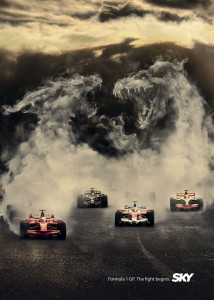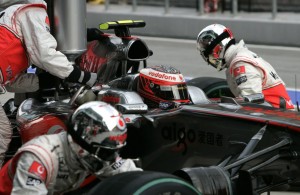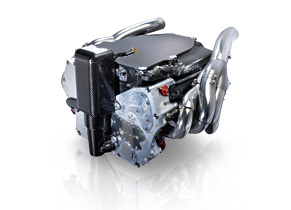Five Best Formula One Adverts
 Formula One and ads don’t really go together any more now that the BBC has taken over from ITV (at least in the UK.)
Formula One and ads don’t really go together any more now that the BBC has taken over from ITV (at least in the UK.)
No longer do we need to worry about missing something vital just as the producer cuts to an ad break – although for those without the ability to pause live TV this has been replaced with the new problem of when to go for a ‘comfort break’.
But just because we hate ads interrupting races doesn’t mean we can’t appreciate a good commercial on our own time. So with that in mind, here are five of the best F1-themed adverts, ever.
Sky – Monsters: The awesome Sky ad on the right is by Italian advertising agency 1861. It is worth having a browse around their site just to see some of their other print and video work.
Tag Heuer – The Duel: In 1969, Tag Heuer introduced the world’s first automatic chronograph. The ‘Monaco’ was radical for its time in also being the first square-cased, water resitant watch in history. A year later Steve McQueen wore a blue Monaco in the classic motor racing film Le Mans. Now, forty years later, Lewis Hamilton stars alongside Steve McQueen in a video promoting the Monaco. If you guess who will win you can win some nice prizes including a limited edition Monaco watch.
Honda – Impossible Dream: At the end of 2004 Honda were on a high. Their engines had driven BAR to second place in the Constructors’ Championship in a season dominated by Schumacher and Ferrari. In September of 2005 Honda purchased the remaining 55% of BAR to become an F1 constructor in their own right for the first time in nearly forty years. Over the next few years Honda would slip further and further down the results before selling the team to Ross Brawn in 2009.
But in December of 2005 the future still looked bright for Honda and they released the ‘Impossible Dream’ commercial, featuring British actor Simon Day riding and driving various Hondas through the New Zealand countryside. Starting on a monkey bike, he progresses from a Super Cub scooter to an ATV, an S500 sports car to a huge Gold Wing motor cycle to a FireBlade superbike. He blasts an S2000 down a gravel road and a TT bike up through a forest. An NSX, the supercar designed with Ayrton Senna’s help, makes an appearance before the beautiful 1965 RA272 F1 car morphs into the BAR 007. Finally, Day drives a powerboat off the edge of a waterfall only to emerge in a hot-air ballon.
Unfortunately for Honda, it really was an impossible dream.
Shell – Refuelling: In 1997 Shell took an airplane, a Formula One car and some cameras deep into the Mojave Desert. What they came out with was pure, unrefined awesomeness.
Shell – Circuit: We finish with another Ferrari/Shell ad that could possibly be the greatest motoring advert of all time. ‘Circuit’ features a stunning array of Ferraris from the last 60 years driving the ultimate street circuit through Rome, New York, Rio, Hong Kong and Monaco. The cars are beautiful but the sounds they make are sublime. Turn it up.
 At the end of last year the FIA published a number of
At the end of last year the FIA published a number of  I’ve been travelling the last few days. In fact I’m typing this right now very early in the morning at Sydney airport. Somehow I managed to arrange things so that I’d be away for both the Malaysian Grand Prix and the Chinese Grand Prix so I was a bit worried that I would be at the mercy of the local TV stations when I wanted to watch the race.
I’ve been travelling the last few days. In fact I’m typing this right now very early in the morning at Sydney airport. Somehow I managed to arrange things so that I’d be away for both the Malaysian Grand Prix and the Chinese Grand Prix so I was a bit worried that I would be at the mercy of the local TV stations when I wanted to watch the race. Formula One is a sport with so many rules and regulations that even the people who make them don’t understand them all.
Formula One is a sport with so many rules and regulations that even the people who make them don’t understand them all. I’ve said
I’ve said